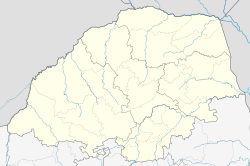Tiyani | |
|---|---|
| Coordinates: 23°18′00″S 30°18′32″E / 23.300°S 30.309°E | |
| Country | South Africa |
| Province | Limpopo |
| District | Vhembe |
| Municipality | Makhado |
| Area | |
| • Total | 9.36 km2 (3.61 sq mi) |
| Population (2011)[1] | |
| • Total | 9,715 |
| • Density | 1,000/km2 (2,700/sq mi) |
| Racial makeup (2011) | |
| • Black African | 99.7% |
| • Coloured | 0.1% |
| • Indian/Asian | 0.1% |
| • Other | 0.1% |
| First languages (2011) | |
| • Tsonga | 96.5% |
| • Other | 3.5% |
| Time zone | UTC+2 (SAST) |
Tiyani is a village situated on the banks of the Middle Letaba Dam in the Hlanganani District of the former Gazankulu homeland, which currently form part of the Vhembe District Municipality in the Limpopo province of South Africa.
Before Waterval (next to the Elim Hospital) was developed, Tiyani used to house the Hlanganani Regional court and the Hlanganani Police station. Today it houses the second Magistrate court in the former Hlanganani district, the New Tiyani Magistrate court, which was inaugurated in 2016 by the deputy minister of Justice and Constitutional development, Mr John Jeffrey. It replaced the now defunct Tiyani branch court, which was established in 1960. The Tiyani Branch Court was, for a short period (between 1982 and 2015), an outpost of Hlanganani Regional Court in Waterval, Elim. The Hlanganani Police station has remained at Tiyani, while the new Waterval Police Station, together with Hlanganani Regional court were established by the Gazankulu Administration at the Waterval township in 1980, next to the Elim Hospital.
Officially the settlement is known as Tiyani, but the area is popularly known (by both the Venda and Tsonga people) as Magoro and was named after a Venda Chief Magoro, who occupied the area before the Tsonga people arrived. The Tsonga people arrived here as refugees from Mozambique during the wars of Manukosi, also known as Soshangane. Forced removal of Venda people took place during the 1960s when Tiyani was declared a Tsonga area and incorporated into Gazankulu homeland. Magoro was also a site where a group of 60 Boer commandos, directed by Joao Albasini and Head chief of VaTsonga, Chief General Nwa-Manugu (the Commander in chief of Joao ), attacked its people, massacred more than 300 people and killed Chief Magoro's son. The military campaign was carried out because chief Magoro had refused to pay tax levied by Joao Albasini and because of his continued support for King Makhado.
- ^ a b c d "Main Place Tiyani". Census 2011.

